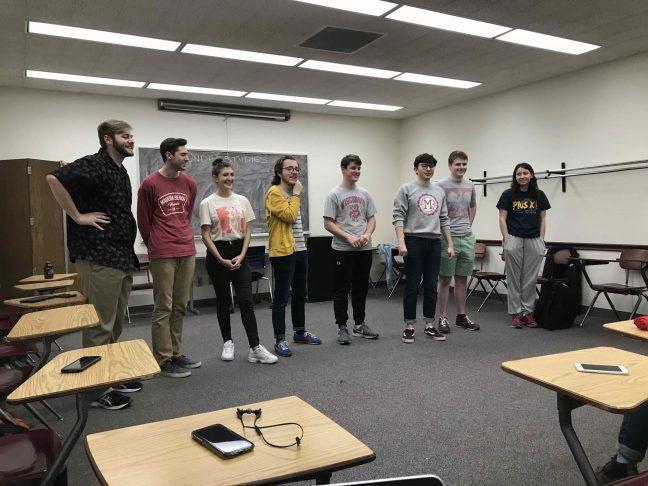The Understudies Improv, the University of Wisconsin’s only short-form improv group, held a workshop Sunday to give guests a glimpse of improv. The group is a staple of UW’s comedy scene, and they regularly perform shows in Memorial Union.
The first workshop of the year was a great opportunity for the group to recruit new members and practice their improv skills.
The practice began with four of the Understudies rotating in a circle, with two performing a scene and the other two waiting to rotate in. The moderator and captain of the group, Owen Desai, called for the circle to be rotated either right or left, which meant that each Understudy had to be prepared to be thrown into a different storyline than they were just performing. It was really interesting to see the Understudies get caught off guard, and then quickly adjust to the new scene.
One thing was clear from the beginning of the workshop — everyone in the group helped cultivate an extremely welcoming, fun-loving and boisterous environment.
Everyone was supportive of each other, and it never felt like any jokes fell flat, even if they seemed to come from nowhere. After each game or exercise, Desai would give feedback about what was working in each scene and what could be done to improve the storyline.
“I never focus on what’s funny or not,” Desai said. “Too much criticism can get people down if it’s framed negatively, so I give notes on what’s working and what can be done differently. Nothing gets taken personally.”
The diversity of wacky subject matter in each scene was remarkable throughout the workshop, and it contributed to the lighthearted nature of the workshop. The Understudies would portray an array of different characters and embody the demographics of these characters in the content of their speech and the accents they used.
Often the performers would not even get to choose their character. In most scenes, one would be given a name, gender identity or demographic by the other character in the scene. This is a staple of the Understudies’ short-form improv, where they are given a select few details. Typically this includes the “who,” “what” and “where” of a scene. Then they run with it.
I was shocked that the Understudies barely prepared the characters, plotline or dialogue of a scene, and that they relied almost entirely on audience suggestions and improvisation to come up with jokes.
The chemistry of the group allows them to fluidly perform scenes and bounce ideas back and forth that usually turn into a ridiculous spectacle of hilarity. Trying to sit through the entire workshop and take notes was considerably difficult, as I could hardly contain myself from laughing at most of their jokes.
Desai believes in the strict improvisational nature of the group’s comedy as a way to bring success.
“Our scenes are all improv — we don’t script anything,” Desai said. “We use our workshops to help us work on our games, but none of the content gets carried over into any show.”
One of the games Desai was referencing is called “Town Hall.” The game is a pro and con debate of any issue chosen by the audience. It uses eight Understudies, four on each side of the issue, standing in the audience debating.
At Sunday’s workshop, the issue was Arizona Iced Tea, and each Understudy assumed a character through which they debated the issue.
My favorite character was Melissa, played by Desai. Melissa was the principal of an all-girls school who insisted it was the most popular drink in the school and that her students would throw a fit if it was removed.
Other notable characters were George Washington, who condoned Arizona Iced Tea because it was the only drink you could buy with a single dollar bill. There was also the local convenience store owner, a hardcore Texan, who would rather sell cow piss than a product from Arizona.
I got to speak with another group member, Kat Azem, and I asked her how the group chooses what identities to embody in their characters, and what portrayals they tend to avoid. Her answer made a lot of sense not only for their group, but also for how many comedians make their choices and navigate the gray area between political correctness and free speech in comedy.
“We’re always culturally sensitive with our jokes because you never know who could be in the audience,” Azem said. “That being said, when I embody a character with an identity different from my own, I avoid stereotypes at all costs, and use the structure of the scene to explore different facets of my character’s identity.”
I had a great time at the Understudies’ workshop, so you’ll probably have an even better time at one of their shows. Check out their Facebook for more details on upcoming events.


